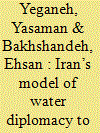| Srl | Item |
| 1 |
ID:
088931


|
|
|
|
|
| Publication |
2009.
|
| Summary/Abstract |
In the first decade of the 21st century, 'hydrosolidarity,' the notion that water management should include considerations of ethics and equity, has influenced international approaches to conducting environmental research and formulating water policy. Since its inception in the 1990s, the term appears frequently across a spectrum of water-related research. It has accordingly permeated discourses and publications on water management. Such rapid proliferation of the concept has helped usher in a wave of transition from conflict management to cooperative efforts between upstream and downstream basin users, as well as a complex paradigm that links both human and environmental welfare. In this paper, we trace the intellectual origins and changing conceptions of hydrosolidarity. We outline some of its applications as well as various reactions to the concept. We close by discussing how the concept can help frame negotiations between riparian states and influence treaty-making and institution-building in river basin settings.
|
|
|
|
|
|
|
|
|
|
|
|
|
|
|
|
| 2 |
ID:
186389


|
|
|
|
|
| Summary/Abstract |
Many countries of the world are suffering from the adverse consequences of water scarcity. The United Nations has estimated that, by the middle of the present century, about 7 billion people in 48 countries, mostly from Southwest Asia, will encounter water scarcity. This may be expedited by the adverse consequences of climate change and global warming which would escalate the risk of war and conflict over transboundary resources. The present research explores the ways water diplomacy can mitigate the dire effects of water scarcity and promote “treaty making” and “institution building” as well as multilateral cooperation on shared waters. The focus is on Iran's water diplomacy with neighboring countries over transboundary resources to forge cooperation and hamper conflict. Our findings suggest that Iran's water diplomacy is constructed on principles of “goodwill and cooperation,” “non-significant harm,” “environmental protection,” and “exchange of data and information” on shared water resources with its neighboring riparian states. Such a model, which has resulted in no dispute between Iran and some of its neighbors such as Pakistan, Turkmenistan, and Armenia in recent years, demonstrates the broader benefits of Iran's approach to water diplomacy and paves the way for stronger cooperation in other areas of mutual interest. Additionally, it encourages multilateral engagement and “hydrosolidarity” within the framework of agreements and the formation of joint “water commissions” for the equitable and reasonable distribution of water among riparian states in line with the 1997 UN Watercourses Convention.
|
|
|
|
|
|
|
|
|
|
|
|
|
|
|
|